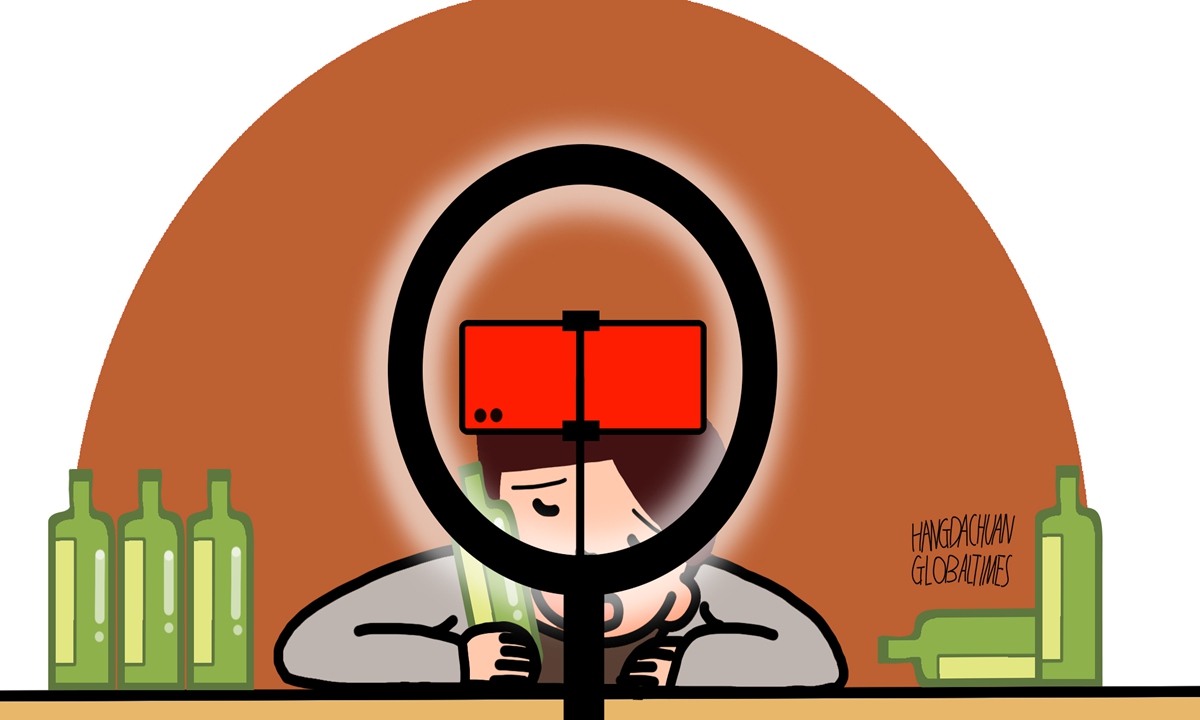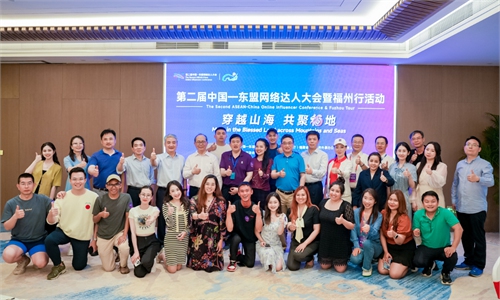ARTS / CULTURE & LEISURE
Life behind the camera more important, even for influencers

Illustration: Hang Dachuan/Global Tim
The sudden death of influencer Sanqiange (Three Thousand Brother) has once again sounded an alarm for livestreaming. The man, surnamed Wang, consumed at least four bottles of baijiu, Chinese spirit, during an online battle prior to his demise.
Livestreaming was originally meant to be a platform for showcasing talents and personalities, enabling creative individuals to generate income. Unfortunately, some have chosen to prioritize their financial gains at the expense of their own well-being, ultimately paving their way to tragedy.
Looking back at similar cases in the past, it becomes apparent that many of these internet celebrities were well aware of the tremendous risks associated with excessive eating or drinking. However, they found themselves unable to extricate themselves from this perilous path, either due to personal reasons or the influence of their contractual agreements with the MCN companies. A myriad of factors exacerbated the situation, culminating in inevitable tragedies.
Although a national regulation on online performances has been officially in place since 2016, there are still internet celebrities who choose to disregard the rules. Some even see these rules as limiting their growth and potentially impeding their future prospects.
Driven by the insatiable quest for popularity and revenue, these content creators are caught in a relentless pursuit of generating high traffic to monetize their online presence. As long as content captures attention and generates traffic, influencers seem to pay little heed to whether their actions violate moral standards or harm their own health. Some individuals believe that bending the rules is a trivial matter, as long as they are not heavily penalized by regulatory authorities.
However, considering the tragedies that have unfolded due to excessive eating and drinking during livestreams, it is apparent that the human body has a way of warning us before it reaches a breaking point. The internet celebrities who tragically lost their lives due to overindulgence were not completely unaware of the risks involved.
Even some netizens who watched these extreme livestreams attempted to remind the influencers of the importance of prioritizing their health by leaving comments. If only they had listened to these well-intended suggestions and made some changes to their livestreaming and consumption habits, then perhaps these tragedies could have been prevented.
Another Chinese man going by the handle Pangzai has also attracted a large number of followers on foreign media platforms for his ability of drinking bottles of beer and baijiu in seconds. As his followers call him "the King" in comments posted under his videos, it is highly hoped that Pangzai will drink responsibly while enjoying delicacies and booze for those who genuinely care about his wellbeing.
While some argue that Sanqiange's tragedy was a consequence of his own decisions, it is clear that the platforms facilitating these events must shoulder their fair share of accountability. Although platforms have implemented moderation systems combining artificial intelligence and human oversight, the challenge of comprehensively monitoring and curbing content violations remains daunting.
Since livestreamers have a certain level of public influence, it is crucial for them to embody public order and moral standards while promoting healthy concepts and lifestyles. There are still countless influencers like Sanqiange, who seek online attention through the extreme consumption of food or drink.
Alternatively, those who do manage to sustain long-term popularity often possess a far-sighted perspective.
The death of Sanqiange serves as a poignant wake-up call for all.
Cultural and educational authorities should intensify their efforts in public education, fostering proper values of responsibility and media literacy. Only through collective efforts can we create a healthy and responsible online environment, protecting the well-being of users and nurturing creativity and positive values, particularly among the younger generation.
By advocating for a responsible and healthy livestreaming culture, we can create an environment where content creators can achieve success without compromising their integrity or endangering their lives. Furthermore, it allows viewers to engage in positive and fulfilling experiences.



